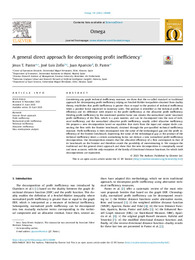Por favor, use este identificador para citar o enlazar este ítem:
https://hdl.handle.net/11000/37961
A general direct approach for decomposing profit inefficiency
Título :
A general direct approach for decomposing profit inefficiency |
Autor :
Pastor, Jesus T.
Zofío, José Luis
Aparicio, Juan
Pastor, Diego |
Editor :
Elsevier |
Departamento:
Departamentos de la UMH::Ciencias del Deporte |
Fecha de publicación:
2023 |
URI :
https://hdl.handle.net/11000/37961 |
Resumen :
Considering any graph technical inefficiency measure, we show that the so-called standard or traditional approach for decomposing profit inefficiency relying on Fenchel-Mahler inequalities obtained from duality theory, establishes that profit inefficiency is greater than or equal to the product of technical inefficiency times a positive factor expressed in monetary units. This product is identified as the technical profit inefficiency and its difference with respect to the profit inefficiency as the allocative profit inefficiency. Dividing profit inefficiency by the mentioned positive factor one obtains the normalized (units’ invariant) profit inefficiency of the firm, which is a pure number, and can be decomposed into the sum of technical inefficiency and the normalized allocative profit inefficiency, usually called allocative inefficiency. We propose a new decomposition based on equalities that starts from the input and output slacks connecting the firm with the frontier benchmark, obtained through the pre-specified technical inefficiency measure. Profit inefficiency is then decomposed into the value of the technological gap and the profit inefficiency of the frontier benchmark. Expressing the value of the technological gap as the product of the technical inefficiency times a certain normalizing factor, we deduce a new normalized profit inefficiency decomposition. Our decomposition ensures that the allocative efficiency of a firm corresponds to that of its benchmark on the frontier and therefore avoids the possibility of overestimating it. We compare the traditional and the general direct approach and show that the new decomposition is conceptually sound and more accurate, with the only exception of the family of directional distance functions, for which both decompositions are equivalent.
|
Palabras clave/Materias:
General Direct approach
Profit inefficiency
Normalized profit inefficiency
Technical inefficiency
Allocative inefficiency
Data envelopment analysis |
Área de conocimiento :
CDU: Bellas artes: Diversiones. Espectáculos. Cine. Teatro. Danza. Juegos.Deportes |
Tipo de documento :
info:eu-repo/semantics/article |
Derechos de acceso:
info:eu-repo/semantics/openAccess
Attribution-NonCommercial-NoDerivatives 4.0 Internacional |
DOI :
https://doi.org/10.1016/j.omega.2023.102889 |
Publicado en:
Omega: The International Journal of Management Science |
Aparece en las colecciones:
Artículos Ciencias del Deporte
|
 La licencia se describe como: Atribución-NonComercial-NoDerivada 4.0 Internacional.
La licencia se describe como: Atribución-NonComercial-NoDerivada 4.0 Internacional.
 La licencia se describe como: Atribución-NonComercial-NoDerivada 4.0 Internacional.
La licencia se describe como: Atribución-NonComercial-NoDerivada 4.0 Internacional.
.png)
